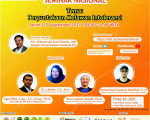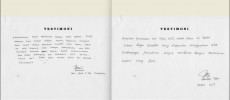Special Library Functionin ImprovingInstitutional Performance
Writer:
Hendrikus Franz Josef, M.Si
Regional Library and Archive Office of
2019
Abstract
The purpose of the special library was established to support the vision and mission of special institutions and function as a special information center especially related to research and development. Usually this library is under a body, institution, institution or organization of business, industry, scientific, government, and education such as universities, companies, departments, professional associations, government agencies and so forth. Special libraries usually have special characteristics when viewed from functions, subjects handled, collections managed, users served, and their position. So that it will be clearly seen the difference with the library in general. The special library also functions as a referral and research center, facilitates the implementation of the tasks of the parent institution which houses it, and functions as a referral and research center as well as a means to facilitate the implementation of the tasks of the institution or agency concerned. There is also that special library as specificity in terms of information that is packaged, collections owned, users, and also how to manage them. The difference between special libraries and other types of libraries, especially in the type of library collections and users. Collections in special libraries are limited to one or a few subjects. This is different from public libraries or national libraries that provide literature on all subjects. Because of the nature of the collection, users of specialized libraries are also limited to people who have a deep interest in certain subjects. Deepening of the subject of this collection can not be done in public libraries that have the breadth of the subject. Function and Purpose of Special Libraries, the success of a special library is closely related to the quality of library management. Special library management of part of the library can serve and provide information needs for the parent organization in achieving its objectives. This is closely related to the function and purpose of special libraries created to assist the activities of the parent organization. So a special library is a library that functions as a reference and research center. The special library also functions to facilitate the implementation of the tasks of the parent institution that houses it. What distinguishes special libraries from other types of libraries, especially in the type of collection and library users. Because of the nature of the collection, users of specialized libraries are also limited to people who have a deep interest in certain subjects. Deepening of the subject of this collection cannot be done in a public library that focuses on the breadth of the subject and not the depth of the subject.
Preface
The library is developing rapidly from time to time in accordance with the development of people's life patterns, needs, knowledge, and information technology. This development also had an impact on the grouping of libraries based on patterns of life, needs, knowledge, and information technology. The term library enlarges to be very broad but tends to have a certain specification. Viewed from the development of information technology, the library developed from traditional, semi-traditional, and digital libraries. Then seen from the pattern of life of the developing community starting from the village library, library of places of worship, private library, mobile library, and so on.
Then also seen from the development of needs and knowledge nowadays there are a lot of emerging terms of public libraries, special libraries, children's libraries, school libraries, college libraries, company libraries, and so forth. But of the many terms and types of libraries, actually based on nature and large group of libraries in general are divided into a special library and public library. Where from the two libraries developed other terms that are tailored to the way management, users, goals, technology used, knowledge packaged, and the purpose of the library was established.
Special libraries are libraries that were established to support the vision and mission of special institutions and function as special information centers especially related to research and development. Usually this library is under a body, institution, institution or organization of business, industry, scientific, government, and education such as universities, companies, departments, professional associations, government agencies and so forth. Special libraries usually also have special characteristics when viewed from functions, subjects handled, collections managed, users served, and their position. So from this it will be clearly seen the difference with the library in general. Special libraries and public libraries when viewed at a glance there are actually not much differences. In fact, not a few occur "overlap" between special libraries and public libraries. Only in certain cases will it be seen that there are significant differences between the two.
Information service is the ability to understand the needs and desires of users and understand the types of library users. Information services also make marketing strategies in the form of relationship marketing, which is a strategy in which the exchange of officers and library users transactions continues, in the sense that it does not end after the transaction is done. On the other hand, satisfaction always comes with complaints. There are always complaints about library users even though librarians have provided assistance to provide information as much as possible. Many problems faced by users of the service, such as being expelled rudely, officers who are not friendly, officers who are not friendly, there is no detailed notification by the officer that makes the user does not know the rules that are in the service.
There are many factors that cause the library to not function properly. Several assumptions can be developed regarding this. It could be due to the unsuccessful management of the library in identifying and understanding the vision and mission and strategic plans of the parent institution, so that the library was not able to work together in realizing the plans set by the parent institution. Another thing is because the library manager has difficulty understanding the desires of the head of the parent institution and the existing staff as stakeholders of the special library. For this reason, on this occasion, the authors invite special library managers to discuss the role of special libraries in improving organizational performance from the perspective of library managers. Specifically, it is more about how the library manager reads the organization's policies so that they can make a breakthrough program in terms of developing shared knowledge that is the library's stake holder.
The Role of Special Libraries in Improving
the Performance of Institutions
A special library in Law Number 43 of 2007 is defined as a library that is intended to be limited to users in government institutions, community institutions, religious education institutions, houses of worship, and other organizations. The Indonesian National standard No. 7496: 2009 concerning Special Libraries Government Agencies defines special libraries as institutions or work units that manage professionally written, printed and recorded works based on a standardized system to support the success/achievement of the vision, mission and objectives of the parent agency the shelter.
If the Law is limited only in terms of ownership, the Indonesian National Standard is more focused on the role and function of special libraries. In terms of function, specific libraries specifically manage written works, print works, and record works that are currently expanded as well as digital works. The special library plays an active role in supporting the achievement of the vision, mission, and goals of the parent institution.
Furthermore, in the Indonesian National Standard for Special Libraries, government agencies explain in general what the specific libraries' mission, tasks and functions are. Special library, in this case the government's special library, has a mission to provide library material and access information for its parent institution. Special library tasks at least, namely: a) support the implementation of the tasks of the parent institution in the form of providing library materials and access to information; b) collect publications from and about their parent institutions; c) providing library and information services; d) utilizing information and communication technology to support library work; e) increase information literacy.
The Indonesian National Standard No. 7496: 2009 further explained the function of special libraries of government agencies in sufficient detail, namely: a) developing collections that support the performance of the parent institution; b) keep all publications from and about the parent institution; c). become the focal point for information published by the parent institution;
d) become a referral center in the field in accordance with its parent institution;
e) organizing library material; f) making use of collections; g). publish secondary and tertiary literature in the field of its parent institution, both printed and electronic; h). organize user education; i). organizing information literacy activities to develop HR competencies its parent institution; j). preserving library materials, both preventive and curative; k). participate in the library and information network collaboration; l). organize library automation;
m) carry out digitization of library materials; n). presenting digital collection services; o). provide access to information at the local, national, regional and global levels
The National Library of the Republic of Indonesia, which in Act Number 43 of 2007 concerning Libraries has the authority to develop National Library Standards, does not deal much with this fundamental issue. This can be seen in the Regulation of the Head of the National Library of the Republic of Indonesia Number 14 of 2017 concerning the National Library Special Standards.
In administering the library, the National Library Special Standards state that the library's vision depicts the main tasks and functions of the library that refer to the parent organization. The library's special mission is to provide library materials and access to information for all visitors at the parent institution and the surrounding community. The tasks and functions of special libraries in the National Library Standards are also very simple. The task of the library is specifically to serve the visitors by providing reading materials in accordance with the needs of the parent institution and the surrounding community. The library functions as a reference library, deposit center, and community learning resource center within the parent institution.
Nevertheless, there are some positive things that exist in the Special Library National Standard as a library management tool to improve the bargaining position of the existence of a special library in this case a special library managed by the government. For example, its existence is at least equivalent to echelon IV and is directly related to the leadership of the parent institution.
Both of these standards are specifically library management can actually be a reference for special library managers in communicating and negotiating with head of parent institution. Moreover, currently, the National Library has begun to carry out its duties to provide guidance by conducting library certification in Indonesia. The role of library associations, especially in this case the Indonesian Special Library Forum to oversee, evaluate, and actively provide input in the application of these two National Standards and their development.
Based on observations and personal experiences, the existence of a library can be categorized as follows: 1). The existence of a library based on regulations or regulations. Libraries of this category such as national libraries, public-run public libraries, school libraries, special libraries in government institutions, and university libraries; 2). The existence of a library based on organizational needs. Libraries of this category are generally due to the awareness of the main actors of the organization that they need the library in the effort to develop and manage knowledge in the organization. In general, this library is located in organizations whose main business is related to research and education; 3). The existence of a library based on the interests of the leadership of the organization. In general, leaders in high-intellectual organizations realize the importance of libraries. However, the leadership's awareness is not part of the organizational culture in the institution. As a result, if the leadership of the organization that is no longer in power. The existence of libraries is threatened. It could be smaller even in many cases the library no longer exists. This condition often occurs in libraries that are managed by the community or community, special libraries in advocacy institutions and NGOs, and libraries within the company. Although in some cases, this also happens to libraries within state institutions.
Libraries in category 1 are relatively safe from the threat of dissolution. This is because this library is protected by laws and regulations. However, libraries that are not directly brought under the Law are very possible to change their conditions. Special libraries are relatively vulnerable to this condition. However, in general, in reality, when an institution experience, a budget deficit, the library is often the first unit to become a victim of budget cuts.
Moreover, if the existence of the library is in the eyes of the leaders, the benefits are not felt by them. For leaders who feel they do not benefit from the library at the institution, the library is considered a cost center. For this reason, this has become a challenge with special library managers to show good performance, be of direct benefit to the parent institution and show its existence in developing innovation within the scope of its parent institution.
Performance is the implementation of the plans that have been prepared. Implementation of performance is carried out by human resources that have the ability, competence, motivation and interests. There are several opinions on this understanding of performance. Performance is the result obtained by an organization and has a strong relationship with the strategic objectives of the organization as well as a description of the level of achievement of the implementation of an activity in realizing the goals, objectives, mission and vision of the organization as outlined in the formulation of a strategic scheme. Performance is a set of behaviors that is relevant to the goals of the organization or organizational unit and is something that people actually do and can be observed. In this sense, performance includes actions and behaviors that are relevant to organizational goals. Performance is not a consequence or outcome of an action, but an action.
From some of the descriptions above, performance is a relevant behavior of individuals in carrying out organizational activities that are implemented in the form of an organization's vision and mission with relevant behavior in realizing organizational goals. There are three types of performance which include, namely:
1. Organizational performance which is a concrete work that can be measured from the organization and can be influenced by process performance or individual performance, which requires performance standards as a measurement tool, so that the performance measures are quantitative and not always reflect the potential of the organization. Organizational performance is obtained from the integration of the factors of knowledge, non-human resources, strategic position, human resource processes and structures. Performance is seen as the achievement of business and social objectives and responsibilities from the perspective of the party concerned.
2. Process performance is a concrete result and can be measured and the working mechanism, organizational work, is influenced by individual performance and requires performance standards as a measurement tool so that performance measures are more qualitative and not always reflect the potential of the organization.
3. Individual performance is a concrete result and can be measured from individual work (individual productivity), influenced by various factors and individual self who need work standards as a measurement so that performance measures are qualitative and do not always reflect individual potential.
This relates to performance management which is a science that integrates art in applying a management concept that has a representative and aspirational level of flexibility to realize the vision and mission of the organization by utilizing the people in the organization to its full potential. The basic principles of performance management can be used as a reference in order to achieve the expected results by becoming a strong foundation for organizational performance to achieve goals.
Based on this, organizational performance is closely related to planning that refers to the vision, mission, and work plan of the organization with the ability of existing human resources in the organization. No exception in this case the library as part of the parent organization. Libraries must be able to reduce the vision and mission and work plans of the parent institution in accordance with the existence of the library as a unit that manages information and knowledge for the benefit of the parent institution. Thus, the library must have human resources which have competence in managing information and knowledge.
In order for a librarian to be able to also manage the knowledge in his institution to work, a librarian also needs to have competencies related to information technology. A librarian must be able to utilize information technology in managing the library and the knowledge in his institution's work.The development of participatory allows direct interaction with users through the internet, facilitating library services, especially for library users.
What abilities should a library manager have. Librarians should ideally use information technology at least in word processing capabilities, online external datatabase, internal online database, telecommunications, spreadsheets, messages and electronic mail, optical scanners, digital optical disks, facsimile communication, database management, database administration, computer based training , CD-ROM, sharing cataloging systems, desktop publishing, automatic lending cooperation, serial routing, automatic acquisition systems, automatic circulation systems, the availability of the latest documents, abstract and indexing systems, and automatic thesaurus construction. Overall capabilities are tailored to the service possible and needed at the institution that leads the library.
This demand is in line with the knowledge managers in the institutions they work for. Information technology in this field is useful to facilitate the communication and capture of existing knowledge in the people at the institution he works for. One of the main components of the competency of a knowledge manager is the ability to use information technology for the business interests of the institution. The expertise required includes information technology applications and information technology literacy. information technology literacy consists of database design, database management, repositories, publishing distribution, business understanding using internet facilities, hardware, information architecture, internal and external sources, integration, intranet and extranet design, programming, software applications, and flow work.
Libraries can be categorized as growing organizations. This can be seen from the longer library life, then generally the collection that is owned is getting bigger. If the printed library collections are enlarged, then in general the library will transfer the media if it turns out that the collection is still needed. Even though we know in the concept of library weeding, but in practice it cannot be leveled for each subject of knowledge. For fields such as natural science, computers or what is known as exact sciences, it is relatively possible to allow strict weeding. However, for the social sciences and humanities, it is relatively difficult for librarians to decide whether a collection is excluded from the collection or not. One way is to transfer the media.
Transferring the media becomes a solution because the publishing world in Indonesia is also not friendly to libraries. Until now, commercial publishing in Indonesia in the development of publishing, making their own applications that directly target the end user. They do not consider the existence of libraries as important because they are considered to be detrimental to their interests. This is reflected in Law No. 3 of 2017 concerning the Book System which altogether denies the existence of libraries as bookkeeping stake holders.
Writer personally consider the transfer of media library collections, especially books that are old and no longer in the market as part of the preservation of knowledge so that it can still be used by visitors. Thus, if a publisher sues this matter, then it will be returned to the publisher who does not accommodate the library as their stake holder. For this reason, there needs to be clear regulations relating to this matter. Back again with regard to the development of library services, breakthroughs and special library innovations in carrying out their role as managers of information and knowledge of the parent institution have begun to vary greatly.
Discussions, seminars, research seminars, book review, watching films together, even to press conferences and public debates began to take place in many libraries. This condition is in line with the understanding of libraries as neutral and democratic organizations in the development of knowledge. The special library is now arranged comfortably for users to learn, discuss, and be a pleasant meeting place. Special libraries even provide a kind of cafe so that users do not need to leave the library for just coffee or other drinks.
This is in line with the role of libraries in the development of knowledge management in parent institutions. The library can facilitate discussions or knowledge sharing forums among staff in the library environment. Knowledge sharing can also bring seniors and experts related to work and programs that are being developed by the parent institution. The knowledge sharing forum program can be packaged more informally so that the ideas, experiences and experiences of the resource persons can be optimally conveyed, and the participants present can also absorb the knowledge conveyed properly.
However, what has not been much touched is the documentation and dissemination of integrated information on a subject. The issue of documenting various works produced by the parent institution is still limited to the development of institutional repositories. Not many have entered into the full meaning of the works produced by people who are in the parent institution. Even though in many laws and regulations, documentation is an important matter.
Libraries play a role in documenting various knowledge that develops in the parent institution. Through this role, it is not only limited to receiving research results, but also discussing in the form of book review or seminar on the results of studies conducted by the parent institutions and documenting these activities. Furthermore, from these activities, the library can repack, make additional literature owned or accessible to the library and disseminate the documentation.
Thus, the library helps other staff if they want to continue and develop programs or research that has been done before. The public can also find out about developments that occur through documented activities. The results of the documentation can be disseminated through existing facilities, both through social media and even mainstream media. In relation to information dissemination, library involvement in information dissemination through social media needs to be intensified. Especially at this time, massive communication and information dissemination through social media have taken place. This role, that shows social media can be a means of scientific communication to share knowledge, in this case Facebook. With the library actively disseminating information through social media, this is also part of participating in combating hoaxes and providing correct information to the public in accordance with the subject area which is the scope of the library's parent institution.
The library actively informs through social media various thoughts and results of studies through social media. Community questions or statements that are manipulating information can be corrected by the library by displaying the results of the study. In addition, the active library displays good things related to the subject matter of the parent institution. Thus, the public will realize that there is a lot of interesting literature to study rather than receiving information that is not necessarily true.
Another thing that is not less important but often does not work well is library collaboration. It is important to realize that basically there is no single library that is able to fulfill all requests for information needed by its users. For this reason, one way to do this is by collaborating with the library. At present, the library is no longer seen how much collection it has, but the most important is how much access can be done by the library. For this reason, special libraries through existing forums need to seriously make library collaboration an important issue for libraries. For this matter, actually there are already several forums that are actively developing library collaboration. In fact, if possible the Indonesian Special Library Forum in developing a library consortium in subscribing to sources and the Indonesian Legal Information Workers Association to share information in meeting the information needs of library users.
.Conclusion
A special library is not only a place to store and collect, and organize the collection, but he established it Special libraries have several purposes, namely: a. Creating and establishing reading habits society; b. Providing information services that are in accordance with user needs; c. Make sure all members of the community can access all kinds of information available; d. Provide convenience to the public in improves science and skills; The purpose of establishing a special library is not only to provide services to users and increase reading fondness, but also to broaden the user's insight and knowledge. This is in accordance with that the purpose of the special library is to meet the needs of library/information materials in its environment in order to support development and improvement of institutions and resource capabilities human power. From these general objectives, the objectives are established.
Specific libraries can be described as follows: a. Develop interests, abilities, and habits .read; b. Develop the ability to search and process as well utilizing information; c. Guiding users to be able to maintain and utilize library materials appropriately and successfully guna; d. Laying the foundations towards independence; e. Cultivate interests and talents; f. Cultivating an appreciation for imaginative experiences; g. Develop the ability to solve problems encountered in life above own responsibility and effort
In many cases, there is actually a lot of work in specialized libraries. Besides being active in providing library services to users in the form of providing information, special library librarians need to be seriously and even if necessary be forced to produce new innovation products in accordance with the scope of the subject matter of their parent institutions.The publication of various tertiary works, such as bibliography, pathfinders, etc. and various information repackaging products can be a way to show the existence of libraries in the parent institution. Library manager in this case librarians need to be active in writing both popular writings and scientific works related to library work. This is a criticism for librarians, especially when talking about information literacy. It is strange how a librarian invites the public to read and utilize information and knowledge in the community, even though the librarian rarely reads and writing and creating.
For this reason, I personally recommend the Indonesian Special Library Forum to hold a kind of Library Innovation Competition or Festival that regularly displays various innovations and products produced by special libraries in Indonesia. In the Festival Indonesian Special Library Forum can also give awards to Special Library librarians who have developed innovations in developing librarians in Indonesia, for example Innovative Librarians. The National Library budgeted a program budget for the Indonesian Special Library Forum, which of with various other institutions those special libraries.
Bibliography
Ghosh, Sharmila, and G. Y. Wesley, A Special Library for Development Research-the Role of the ISS Library in Managing Information Requirements for Research. INSPEL 36.2, 2002;.
Mayora, Hilda, and Malta Nelisa, Strategi Peningkatan Pemanfaatan Perpustakaan di Perpustakaan Khusus Sekretariat DPRD Provinsi Sumatera Barat, Ilmu Informasi Perpustakaan dan Kearsipan 2.1, 2013:.
Matarazzo, James M., and Suzanne D. Connolly, eds., Knowledge and Special Libraries, Routledge, 1999;
Oiah, Marydee, Core Competencies for Special Library Managers of the Future, SJSU Scholar Works,1993;
Surachman, Arif. Pengelolaan Perpustakaan Khusus, Seminar Jurusan Seni Kriya, 2005;
Wesson, Caren L., and Margaret J. Keefe, Serving Special Needs Students in the School Library Media Center, Greenwood Professional Guides in School Librarianship, Greenwood Press, 88 Post Road West, Westport, CT 06881, 1995.
Perpustakaan Lainnya
 PEMENANG LOMBA PERPUSTAKAAN SEKOLAH SMA/SMK/MA SE-DIY
PEMENANG LOMBA PERPUSTAKAAN SEKOLAH SMA/SMK/MA SE-DIY
Dinas Perpustakaan dan Arsip Daerah DIY menyelenggarakan Lomba Perpustakaan Sekolah SMA/SMK/Ma Se-Daerah Istimewa Yogyakarta....
 Webinar Nasional Perpustakaan Melawan Intoleransi
Webinar Nasional Perpustakaan Melawan Intoleransi
Webinar Nasional : Perpustakaan Melawan Intoleransi Indonesia adalah negara kepulauan yang terbentang dari Sabang sampai...
 LAYANAN ARTIKEL LUAR NEGERI BPAD DIY
LAYANAN ARTIKEL LUAR NEGERI BPAD DIY
Kabar gembira bagi Anda yang sedang menyusun tesis, skripsi atau menempuh pendidikan di perguruan tinggi. BPAD DIY memberikan...
 Kunjungan KB Pemanahan ke Rumah Belajar Modern
Kunjungan KB Pemanahan ke Rumah Belajar Modern
Kamis, 12 April 2018 Rumah Belajar Modern kembali menerima kunjungandari KB Pemanahan Pleret. Kegiatan ini dibuka oleh Pak Saimin...

 Kegiatan Penyususnan Katalog Induk Daerah (KID)
Kegiatan Penyususnan Katalog Induk Daerah (KID)